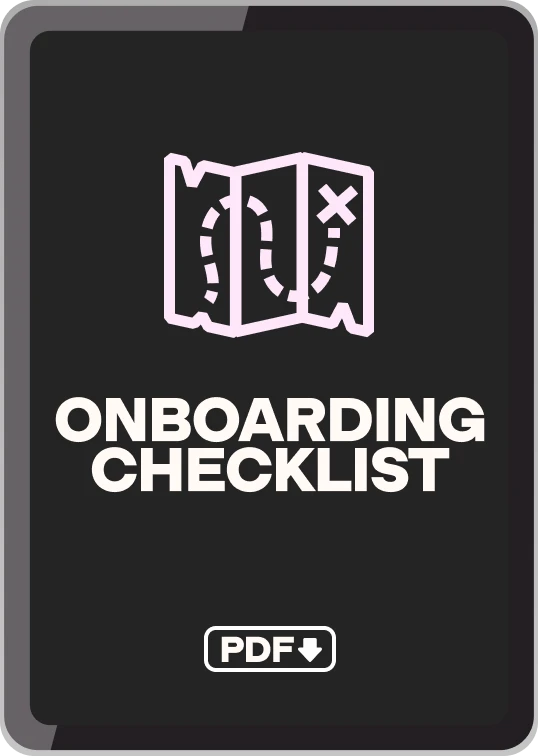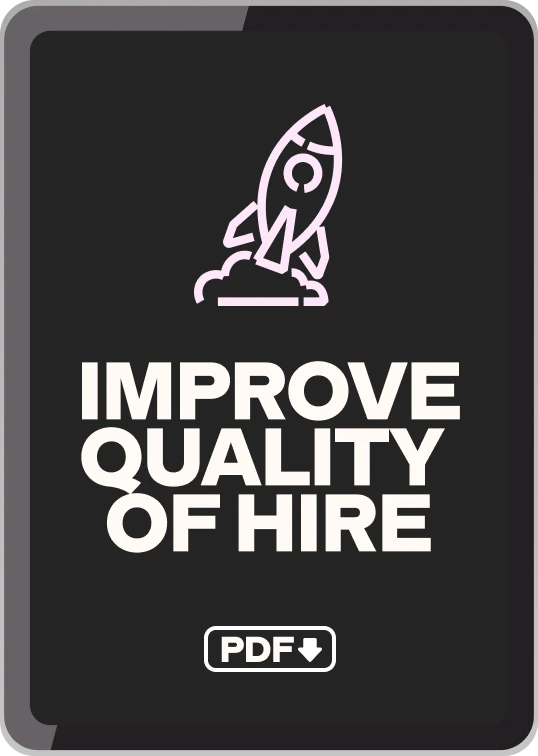How to support ISTJ personality types in the workplace
Known for their reliability, dedication, and meticulous attention to detail, Logistician personalities (ISTJs) are the backbone of many teams. They thrive on structure and are exceptional at creating and maintaining organized systems, making them invaluable in any workplace.
However, their strong preference for structure and routine may lead to challenges adapting to new methods or ideas, potentially causing friction in dynamic team settings.
In this article, we discuss ISTJs' 16-personalities type, highlighting their strengths and offering insights on how to support them in overcoming their challenges.
Table of contents
Overview of ISTJs in the workplace
Logisticians have the following core traits:
Introverted: ISTJs recharge in solitude, favoring quiet, focused environments where they can reflect and process information internally.
Sensing: They prioritize facts and practical details, valuing concrete data over abstract concepts.
Thinking: They make decisions based on logic and reason, prioritizing objective analysis over emotion.
Judging: They prefer structure and organization. They thrive on having plans and schedules and dislike ambiguity or open-endedness.
Strengths and contributions to the workplace
Here are some strengths of ISTJs.
Reliability and dedication: Logisticians combine a strong work ethic with deep loyalty to their commitments.
Logical problem-solving: With a natural knack for practical solutions, Logisticians excel in strategic planning and problem resolution.
Direct communication: Their straightforward communication style ensures clarity and efficiency, contributing to transparent workplace interactions.
Methodical approach: ISTJs’ attention to detail and structured work method contribute significantly to project and task management.
Loyalty and duty: Logisticians are very responsible and often exceed expectations to fulfill their organizational roles.
Common challenges and pain points
Here are some potential limitations to watch out for in Logisticians.
Difficulty with emotional expression: ISTJs may find navigating emotional communication challenging, leading to potential misunderstandings.
Resistance to change: Their preference for routine and structure can hinder their response to new and unexpected changes.
Difficulty dealing with ambiguity: Tasks lacking clear instructions can pose difficulties for ISTJs, who thrive on precision and clarity.
Tendency to be critical: While their critical nature ensures high standards, it may inadvertently cause friction with colleagues who perceive feedback differently.
Below, we discuss how you can address these challenges through effective strategies for navigating Logisticians’ communication styles, motivating them, and more.
Navigating ISTJ communication styles and team dynamics
ISTJs, with their practicality and dedication, are invaluable in teams but may face communication challenges due to their reserved nature and love for structure, potentially leading to conflicts. To harness their strengths while fostering flexibility, consider the following strategies.
Effective communication strategies for ISTJ personality types
Let’s explore key strategies to ensure your messages resonate with ISTJs, enhancing clarity and mutual understanding.
Be clear and factual: ISTJs appreciate straightforwardness. Avoid ambiguity and emotional language, focusing on data and objective information.
Rely on logic: Present new ideas logically – backed by facts and figures – to help them understand the need for any changes.
Practice active listening: Show interest in their views through active listening and patience, encouraging open dialogue.
Best practices for integrating ISTJ personality types into teams
Here are some best practices for making the most of ISTJs’ contributions.
1. Set clear goals and responsibilities
Clearly define team goals and individual responsibilities to minimize ambiguity. You can leverage ISTJs' strong sense of duty by aligning their tasks with the team’s objectives.
2. Respect their need for autonomy
Logisticians work best when given autonomy to complete tasks. While they’re cooperative team members, they appreciate having space to work through problems and execute tasks without unnecessary interference.
3. Educate the team about ISTJs' reserved nature
Explain to your team members that ISTJs’ reserved nature does not indicate detachment or lack of enthusiasm. You can highlight their strengths – such as their reliability and dedication – to offset any misconceptions about their quiet demeanor.
Tips for preventing and resolving conflicts
Logisticians' resistance to change and tendency to be critical may cause friction, though they typically avoid conflict. Conflict resolution with them requires a thoughtful approach that respects their logical nature and preference for direct communication. Here’s how you can approach this.
1. Provide structured feedback
When offering constructive feedback, be specific and objective. ISTJs respond well to criticism clearly linked to outcomes and improvements. For example, instead of saying, “You need to improve your reports,” you might say, “Incorporating more data analysis in your reports could enhance their impact on decision-making processes.”
2. Introduce changes gradually
Introduce changes to processes and procedures in small, manageable steps. Show them how slight changes can lead to efficient outcomes without disrupting the overall system. For instance, if implementing a new software system, start by integrating it into one aspect of their work before rolling it out fully, explaining each step’s benefits.
3. Mediate conflict and emphasize collaboration
Mediate conflict between Logisticians and other team members, especially those with more emotional personality types. Try to prevent misunderstandings between them by facilitating a discussion where each person can express their viewpoint in a structured format, helping to bridge the communication gap.
Frame conflicts as opportunities for improvement – not personal attacks. Work together to find solutions that benefit the entire team.
How to motivate ISTJ employees and keep them engaged
Understanding what motivates and engages them is crucial for maximizing their potential and fostering loyalty to your company. Let's explore the key motivators for Logisticians in the workplace.
What motivates ISTJ personality types at work
ISTJs are motivated by stability, structure, and clear expectations. They value a well-organized work environment where policies and procedures are clearly defined and consistently applied. They also enjoy work that involves detailed planning and execution, which allows them to use their organizational skills and commitment to efficiency.
Strategies for engaging ISTJ types
To engage ISTJ employees, do this:
Assign tasks that leverage their strengths: Delegate projects requiring organization, analysis, and problem-solving. Allow them to work independently while offering support when needed.
Involve them in decision-making: Seek their input on process improvements and organizational changes. Use their logical thinking and practical perspective for better solutions.
Provide regular feedback: Offer specific, constructive feedback focused on improved outcomes.
Promote collaboration and teamwork: Pair them with colleagues who complement their work styles, fostering shared learning and achieving common objectives.
Help them navigate uncertainty: Set specific, achievable goals and supply all necessary context, guiding them to feel more secure when navigating uncertainty.
Offer specific, sincere feedback and appreciation, whether through one-on-one meetings or team acknowledgments. This boosts their morale.
Tools and techniques to enhance productivity
ISTJs are naturally good at management and organization skills, but providing them with the following tools and techniques to prioritize tasks and mitigate procrastination can further enhance their productivity:
Project management tools enable ISTJs to oversee projects with clarity and precision. For example, Asana is a project management software that allows ISTJs to break projects into manageable tasks and set deadlines, enhancing their natural organizational skills.
Data analysis tools enable ISTJs to process information efficiently. For example, Excel is a spreadsheet software that can help Logisticians efficiently organize and analyze data, supporting their detail-oriented nature.
Templates and checklists can streamline routine tasks. For instance, Todoist is a task management app they can use for daily and weekly checklists.
Time management techniques or apps can teach ISTJs to minimize distractions and reduce procrastination. The Pomodoro technique, which involves focused work intervals followed by short breaks, can help ISTJs maintain high productivity levels by minimizing distractions, for example.
Tips for supporting ISTJs’ well-being
Creating a stable, predictable work environment reduces stress for Logisticians. Plus, regular communication about changes and expectations and reliable routines support their need for order and predictability.
You should be vigilant for signs of burnout in ISTJ employees, who may tend to overcommit themselves due to their strong sense of duty. Encouraging regular breaks, work-life balance, and supporting workload management are essential strategies. To do this, you might implement flexible working hours, offer mental health days, and use efficient task delegation.
Guidance on personal development and career growth for ISTJs
You can create a tailored, supportive environment to unlock ISTJs’ full potential. Consider offering them the following growth opportunities.
Provide specialized training
Encourage Logisticians to pursue certifications or courses in their areas of interest or expertise, such as project management, data analysis, or quality control management. Their love for mastering details and improving efficiency makes them excellent candidates for specialized training to deepen their knowledge and enhance their skill set.
Recognize leadership potential
ISTJs, with their knack for organization and reliability, are natural in leadership positions that demand a systematic approach. Spotting future leaders through leadership assessments and guiding them into project lead roles plays to their strengths, fostering their leadership and team management growth.
Involve them in process improvement initiatives
ISTJs have a keen eye for inefficiencies and a natural tendency towards optimization. Involving them in process improvement projects, like automating repetitive administrative tasks or streamlining supply chain processes, can give them a sense of accomplishment and encourage their growth.
Offer mentorship opportunities
Mentorship and constructive feedback add to more fulfilling professional growth. Here’s how you can approach these:
Cultivate a mentorship program: Pair ISTJs with experienced professionals who understand their personality and can offer career insights and guidance. This personal connection provides invaluable support and direction.
Facilitate peer-to-peer learning: Encourage participation in professional organizations or internal communities like employee resource groups. Connecting with like-minded individuals fosters knowledge sharing, peer support, and broader networking opportunities.
Embrace continuous learning: Make ongoing training and development readily available. Encourage Logisticians to participate in seminars, online courses, or workshops to stay relevant and expand their skill set.
Maximize ISTJs’ potential with TestGorilla
ISTJs bring unparalleled organizational skills, reliability, and dedication to duty to the workplace. However, their preference for structure can sometimes stifle flexibility and innovation.
By assigning tasks that align with their methodical approach, respecting their need for autonomy, and introducing changes gradually, you can foster a productive environment.
TestGorilla is a talent assessment platform that can help you support your employees in various ways. Our blog contains more advice and guides, and we offer employee skills assessments that can help you learn more about your employees – including your Logisticians – so you can unlock their full potential. This way, you can foster both individual satisfaction and collective success.
Want to learn more? Create a free account or sign up for a demo today.
Related posts
You've scrolled this far
Why not try TestGorilla for free, and see what happens when you put skills first.
Latest posts
The best advice on pre-employment testing, in your inbox.
No spam. Unsubscribe at any time.

Hire the best. No bias. No stress.
Our screening tests identify the best candidates and make your hiring decisions faster, easier, and bias-free.
Free resources
This checklist covers key features you should look for when choosing a skills testing platform
This resource will help you develop an onboarding checklist for new hires.
How to assess your candidates' attention to detail.
Learn how to get human resources certified through HRCI or SHRM.
Learn how you can improve the level of talent at your company.
Learn how CapitalT reduced hiring bias with online skills assessments.
Learn how to make the resume process more efficient and more effective.
Improve your hiring strategy with these 7 critical recruitment metrics.
Learn how Sukhi decreased time spent reviewing resumes by 83%!
Hire more efficiently with these hacks that 99% of recruiters aren't using.
Make a business case for diversity and inclusion initiatives with this data.

















